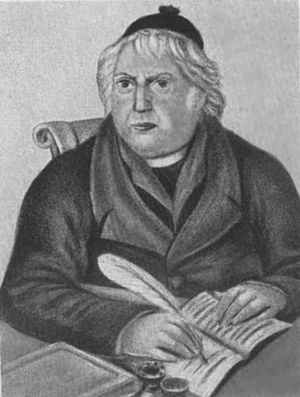José Agostinho de Macedo facts for kids
Quick facts for kids
José Agostinho de Macedo
|
|
|---|---|
 |
|
| Born | 11 September 1761 Beja, Kingdom of Portugal
|
| Died | 2 October 1831 (aged 70) |
| Occupation | Writer |
José Agostinho de Macedo (born September 11, 1761 – died October 2, 1831) was a famous Portuguese poet and writer. He wrote both poems and stories.
José Agostinho de Macedo's Early Life
José Agostinho de Macedo was born in Beja, a city in Portugal. His family were farmers. He went to school in Lisbon, Portugal with a group called the Oratorians. There, he learned Latin and how to speak well.
In 1778, he became a monk with the Augustinian order. However, he had a strong personality and often got into trouble. He spent a lot of time in prison and was moved from one convent (a place where monks live) to another. Because of this, he decided to leave the monk life and live in the city of Lisbon.
In 1792, he was officially removed from his role as a monk. But with help from powerful friends, he received special permission from the Pope. This allowed him to become a regular priest, not a monk, and keep his church status. He then started working as a journalist and a preacher. He quickly became well-known for his speeches. By 1802, he was even one of the royal preachers for the king.
José Agostinho de Macedo's Writing Career
Macedo was one of the first in Portugal to write a type of poetry called "didactic" and "descriptive." This means his poems taught lessons and described things. A great example is his poem Meditation (written in 1813).
He also tried to become Portugal's greatest poet, hoping to be even better than Luís de Camões, who was very famous. In 1814, Macedo wrote an epic poem called Oriente. This poem was about the same topic as Camões' famous work, Os Lusíadas. Both poems told the story of Vasco da Gama's voyage to India. However, Macedo's poem was not very popular. After this, he wrote Censura dos Lusiadas, which was a very critical review of Camões' work.
Macedo started many newspapers and wrote for them. He also wrote many political pamphlets. His writing style was often funny and satirical (making fun of things), which made him popular. He strongly supported absolute rule (where a king has all the power). He wrote fiercely against those who wanted a constitution (a set of rules for the government). He even suggested strong actions against people who disagreed with the Miguelist government.
Even when he was old and a priest, he kept writing strong articles. Eventually, his own political group felt he was going too far. In 1829, he resigned from his job as a censor of books (someone who checks books before they are published).
When he passed away in 1831, he had many friends and fans. He was famous for a time, but his literary fame did not last forever. He wanted to be the best writer, which led to a famous disagreement with another poet, Bocage. Bocage's poem Pena de Taliao was a very tough blow to Macedo.
Macedo also wrote a satirical poem called Os Burros (1812–1814). In this poem, he made fun of many people from different parts of society. He also translated the Odes of Horace and wrote some plays. These works show how many different types of writing he could do. His work A Demonstration of the Existence of God also shows how smart he was. As a poet, his poems about Wellington and Emperor Alexander show real talent. His love poems in Lyra anacreontica also have good quality.
See also
 In Spanish: José Agostinho de Macedo para niños
In Spanish: José Agostinho de Macedo para niños
 | Janet Taylor Pickett |
 | Synthia Saint James |
 | Howardena Pindell |
 | Faith Ringgold |

